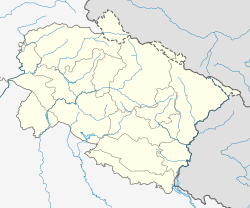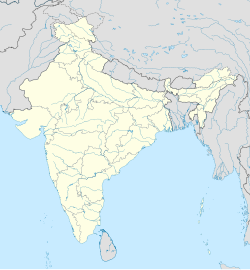Mukteshwar is a village and tourist destination in the Nainital district of Uttarakhand, India. It sits high in the Kumaon Hills at an altitude of 2171[1] meters (7500 feet), 51 km from Nainital, 72 km from Haldwani, and 343 km from Delhi.
Mukteshwar | |
|---|---|
Village | |
 View from Chauli Ki Jali, Mukteshwar | |
| Coordinates: 29°28′20″N 79°38′52″E / 29.4722°N 79.6479°E | |
| Country | |
| State | Uttarakhand |
| District | Nainital |
| Elevation | 2,171 m (7,123 ft) |
| Population (2011) | |
• Total | 812 |
| Languages | |
| • Official | Hindi |
| Time zone | UTC+5:30 (IST) |
| PIN | 263138 |
| Telephone code | 05942 |
| Vehicle registration | UK-04 |
| Website | uk |
Places of interest
editMukteshwar Shiva temple
editMukteshwar gets its name from a 350-year-old temple of Shiva, known as Mukteshwar Dham,[2] situated atop the highest point in the town, on the veterinary institute's campus. Close to it lie the overhanging cliffs, locally known as Chauli-ki-Jali,[3] used for rock climbing and rappelling, with an excellent view of the valleys below. Mukteshwar is famous for its breezy waterfalls such as The Bhalu Ghaad, Tarikhet waterfalls, Rudradhari waterfall and Dhokaney waterfall. The sunrise point is at the government-run PWD guest house. Another tourist attraction is the small Satoli Village, situated just 21 km from Mukteshwar. One can also visit the Indian Veterinary Research Institute (IVRI).
Other
editSome of the edifices of this town are the IVRI laboratories (experiments on tiny rats, gold-plated books, cattle-sheds), orchards of the Central Institutes of Temperate Horticulture-Regional Station, an expansive deodar forest (Himalayan cedar) measuring 15 square miles, 22 pristine snow-peak views, and the adventure of living among wildlife such as tigers and bears are. The charm of visiting Mukteshwar lies in enjoying nature, listening to air gushing through deodar forests, bird watching, meditation, and seeking peace. The cleanliness, solitude, and nature attract people escaping urban life.
Mukteshwar is also home to a post office founded in 1905 which finds mention in Jim Corbett's writing.
History
editMukteshwar was previously known as Muktesar (as mentioned in Jim Corbett's book "The Temple Tiger"); the name changed after 1947. Many locals still call it Muktesar in their native language. Until 1893 the place was known for its shrines and temple before it was selected for serum production to protect animals from cattle plague.[4] On the recommendation of the Cattle Plague Commission, the Imperial Bacteriological Laboratory had its genesis on 9 December 1889 at Pune and relocated to Mukteshwar in 1893[5] to facilitate segregation and quarantine of highly contagious organisms. Initially the laboratory at Mukteshwar was completed in 1898 but destroyed by fire in 1899. It was resurrected in 1901. Then annual expenditure on research was Rs. 50,000.[4] Later it was developed into the Indian Veterinary Research Institute (IVRI), which later moved its headquarters to Izatnagar. Still Mukteshwar serves as the hill campus of IVRI, including facilities such as an experimental goat farm.[6][7]
The Nobel winner scientist Robert Koch visited this place on the request of the government of India. The microscope used by him and other historical articles are kept in the museum maintained by IVRI. A hill carved cold room dating back to 1900 once used to store biological materials is now a tourist attraction.
Jim Corbett, author and hunter of man-eating tigers and leopards visited Mukteshwar. He wrote about Mukteshwar in his book The Temple Tiger and More Man-Eaters of Kumaon. He wrote about the various adversities faced by the people inhabiting the villages in remote areas of the Northern hills.
Rock climbing & rappelling
editFruit orchards, coniferous forests, lush green trails and narrow lanes make Mukteshwar a special destination for trekking. Apart from trekking, camping, paragliding; Mukteshwar is also known for rock climbing and rappelling.[8] The region is full of hard rocky hills, which are suitable for rock climbing. Exotic travelers visit here to experience these activities. Rocky hills of Mukteshwar are quite strong.[clarification needed] However, this adventure sport may be a little risky in the rainy days. Popular trails in Mukteshwar include:[citation needed]
Geography
edit| Mukteshwar | ||||||||||||||||||||||||||||||||||||||||||||||||||||||||||||
|---|---|---|---|---|---|---|---|---|---|---|---|---|---|---|---|---|---|---|---|---|---|---|---|---|---|---|---|---|---|---|---|---|---|---|---|---|---|---|---|---|---|---|---|---|---|---|---|---|---|---|---|---|---|---|---|---|---|---|---|---|
| Climate chart (explanation) | ||||||||||||||||||||||||||||||||||||||||||||||||||||||||||||
| ||||||||||||||||||||||||||||||||||||||||||||||||||||||||||||
| ||||||||||||||||||||||||||||||||||||||||||||||||||||||||||||
Mukteshwar is located at 29°28′20″N 79°38′52″E / 29.4722°N 79.6479°E.[10] It has an average elevation of 2,171 metres (7,500 feet). Mukteshwar is situated in Nainital district at a distance of 51 km from Nainital, the district's administrative headquarter and 72 km from Haldwani, the largest city in Nainital.
Mukteshwar's scenery includes views of the Indian Himalayas and India's second-highest peak, Nanda Devi. Because of the hilly topography, agriculture in the area consists chiefly of potato fields and fruit orchards on terraces cut into the hillsides.
Climate
editMukteshwar has a subtropical highland climate (Köppen climate classification Cwb). The pattern of seasons is similar to that in other parts of northern India, with distinct summer, monsoon and winter seasons. However, due to its high elevation, Mukteshwar is spared the intense heat of lower-lying towns and cities. Mukteshwar has cold winters and relatively cool summer with drastically escalated rain, in relation with lower altitudes, and frequent fog. Summers are warm with moderate rainfall, while the monsoon season is slightly cooler and features much heavier rain. Winters can be quite cool, and temperatures below freezing are not unusual. Snowfall occurs occasionally in December and January, though it is sparse, while the heavy rainfall events occurs during the monsoon season stretching from July to September.
| Climate data for Mukteshwar (1991–2020, extremes 1901–2020) | |||||||||||||
|---|---|---|---|---|---|---|---|---|---|---|---|---|---|
| Month | Jan | Feb | Mar | Apr | May | Jun | Jul | Aug | Sep | Oct | Nov | Dec | Year |
| Record high °C (°F) | 23.0 (73.4) |
24.2 (75.6) |
28.5 (83.3) |
31.5 (88.7) |
31.1 (88.0) |
32.5 (90.5) |
30.6 (87.1) |
27.9 (82.2) |
26.8 (80.2) |
25.5 (77.9) |
23.1 (73.6) |
22.5 (72.5) |
32.5 (90.5) |
| Mean daily maximum °C (°F) | 12.1 (53.8) |
13.5 (56.3) |
17.9 (64.2) |
22.4 (72.3) |
24.2 (75.6) |
23.7 (74.7) |
21.4 (70.5) |
20.9 (69.6) |
20.8 (69.4) |
19.7 (67.5) |
17.2 (63.0) |
14.4 (57.9) |
19.0 (66.2) |
| Mean daily minimum °C (°F) | 1.7 (35.1) |
2.7 (36.9) |
5.8 (42.4) |
9.7 (49.5) |
12.1 (53.8) |
13.8 (56.8) |
14.2 (57.6) |
13.9 (57.0) |
12.6 (54.7) |
9.3 (48.7) |
6.1 (43.0) |
3.6 (38.5) |
8.8 (47.8) |
| Record low °C (°F) | −7.6 (18.3) |
−7.8 (18.0) |
−5.9 (21.4) |
−1.7 (28.9) |
2.3 (36.1) |
5.9 (42.6) |
8.1 (46.6) |
9.8 (49.6) |
6.1 (43.0) |
0.8 (33.4) |
−2.3 (27.9) |
−5.7 (21.7) |
−7.8 (18.0) |
| Average rainfall mm (inches) | 45.6 (1.80) |
68.1 (2.68) |
46.8 (1.84) |
46.2 (1.82) |
63.9 (2.52) |
158.6 (6.24) |
288.4 (11.35) |
283.4 (11.16) |
228.9 (9.01) |
30.4 (1.20) |
7.9 (0.31) |
17.7 (0.70) |
1,286 (50.63) |
| Average rainy days | 3.0 | 4.2 | 3.6 | 4.0 | 5.7 | 9.4 | 14.6 | 14.1 | 9.8 | 1.7 | 0.7 | 1.1 | 71.6 |
| Average relative humidity (%) (at 17:30 IST) | 61 | 63 | 57 | 45 | 56 | 71 | 88 | 90 | 86 | 73 | 67 | 58 | 68 |
| Source: India Meteorological Department[11][12][13] | |||||||||||||
Kumaon Vani radio service
editWith the aim to create a common platform for local communities of Supi in Uttarakhand, TERI launched 'Kumaon Vani', a community radio service on 11 March 2010. Uttarakhand governor Margaret Alva inaugurated the radio station, the first in the state. The 'Kumaon Vani' aims to air programmes on environment, agriculture, culture, weather and education in the local language and with the active participation of the communities. The station covers a radius of 10 km reaching out to almost 2000 locals around Mukteshwar.[14]
New development
editThere is a 'Renewable Park' developed by TERI. The renewable park uses solar electricity for most of its electricity needs. Recently,[when?] the town has experienced some construction activity and townships have begun to mushroom in and around Mukteshwar. Many people are buying holiday homes here to escape larger cities.[citation needed]
Transport
editThe nearest airport is at Pantnagar and the nearest railway head is at Kathgodam, 65 km from the town, from where vehicular transport is easily available for neighbouring towns of Bhimtal, Bhowali, Haldwani and Nainital.
The other means of road transport in the city include Share taxis, regionally known as Jeeps, on-call metered taxis and tourist taxis. The state transportation bus service is available from Nainital.
References
edit- ^ "NAINITAL TOURISM 1000 Pages Since 1999 - Mukteshwar | Mukteshwar Tourism | Mukteshwar Temple | Mukteshwar Travel Guide | Mukteshwar Nainital India | Camping In Mukteshwar | How To Reach Mukteshwar | Mukteshwar Weather | Mukteshwar Distance Chart |". www.highwaymonks.com. Archived from the original on 8 February 2017. Retrieved 27 January 2016.
- ^ Dasgupta, Shailza Sood DasguptaShailza Sood. "Mukteshwar Dham Temple". The Times of India. ISSN 0971-8257. Retrieved 6 July 2023.
- ^ "Chauli Ki Jali". jüSTa. 29 September 2022. Retrieved 6 July 2023.
- ^ a b Imperial Gazetteer of India, Volume 18, Page 18
- ^ Mukteshwar Archived 2008-06-21 at the Wayback Machine Official website of Nainital district
- ^ Evolution of IVRI Archived 2009-02-08 at the Wayback Machine Indian Veterinary Research Institute Official website.
- ^ Campuses Archived 2009-02-01 at the Wayback Machine, Indian Veterinary Research Institute official website.
- ^ "Activities in Mukteshwar – Things to do in Mukteshwar – Adventure in Mukteshwar". www.euttaranchal.com. 15 August 2017. Retrieved 6 July 2023.
- ^ "World Weather Information Service". worldweather.wmo.int. Retrieved 16 November 2016.
- ^ Falling Rain Genomics, Inc - Mukteshwar[permanent dead link]
- ^ "Climatological Tables of Observatories in India 1991-2020" (PDF). India Meteorological Department. Retrieved 8 April 2024.
- ^ "Station: Mukteswar (Kumaun) Climatological Table 1981–2010" (PDF). Climatological Normals 1981–2010. India Meteorological Department. January 2015. pp. 507–508. Archived from the original (PDF) on 5 February 2020. Retrieved 15 February 2020.
- ^ "Extremes of Temperature & Rainfall for Indian Stations (Up to 2012)" (PDF). India Meteorological Department. December 2016. p. M226. Archived from the original (PDF) on 5 February 2020. Retrieved 15 February 2020.
- ^ "TERI launches 'Kumaon Vani' community radio service in Uttarakhand". 13 March 2010.
External links
edit- Mukteshwar travel guide from Wikivoyage
- Magical Mukteshwar – Breathing The Mountain Goodness

